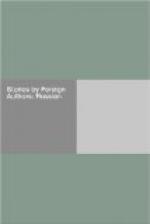“Here I have been in action, I have fought, they have seen me under fire,” [Footnote: On m’a vu au feu.] he continued; “but when will it all end? I think, never. And my strength and energy have already begun to flag. Then I had imagined la guerre, la vie de camp; but it isn’t at all what I see, in a sheepskin jacket, dirty linen, soldier’s boots, and you go out in ambuscade, and the whole night long lie in the ditch with some Antonof reduced to the ranks for drunkenness, and any minute from behind the bush may come a rifle-shot and hit you or Antonof,—it’s all the same which. That is not bravery; it’s horrible, c’est affreux, it’s killing!” [Footnote: Ca tue]
“Well, you can be promoted a non-commissioned officer for this campaign, and next year an ensign,” said I.
“Yes, it may be: they promised me that in two years, and it’s not up yet. What would those two years amount to, if I knew any one! You can imagine this life with Pavel Dmitrievitch; cards, low jokes, drinking all the time; if you wish to tell anything that is weighing on your mind, you would not be understood, or you would be laughed at: they talk with you, not for the sake of sharing a thought, but to get something funny out of you. Yes, and so it has gone—in a brutal, beastly way, and you are always conscious that you belong to the rank and file; they always make you feel that. Hence you can’t realize what an enjoyment it is to talk a coeur ouvert to such a man as you are.”
I had never imagined what kind of a man I was, and consequently I did not know what answer to make him.
“Will you have your lunch now?” asked Nikita at this juncture, approaching me unseen in the darkness, and, as I could perceive, vexed at the presence of a guest. “Nothing but curd dumplings, there’s none of the roast beef left.”
“Has the captain had his lunch yet?”
“He went to bed long ago,” replied Nikita, gruffly, “According to my directions, I was to bring you lunch here and your brandy.” He muttered something else discontentedly, and sauntered off to his tent. After loitering a while longer, he brought us, nevertheless, a lunch-case; he placed a candle on the lunch-case, and shielded it from the wind with a sheet of paper. He brought a saucepan, some mustard in a jar, a tin dipper with a handle, and a bottle of absinthe. After arranging these things, Nikita lingered around us for some moments, and looked on as Guskof and I were drinking the liquor, and it was evidently very distasteful to him. By the feeble light shed by the candle through the paper, amid the encircling darkness, could be seen the seal-skin cover of the lunch-case, the supper arranged upon it, Guskof’s sheepskin jacket, his face, and his small red hands which he used in lifting the patties from the pan. Everything around us was black; and only by straining the sight could be seen the dark battery, the dark form of the sentry moving along the breastwork, on all sides the watch-fires, and on high the ruddy stars.




